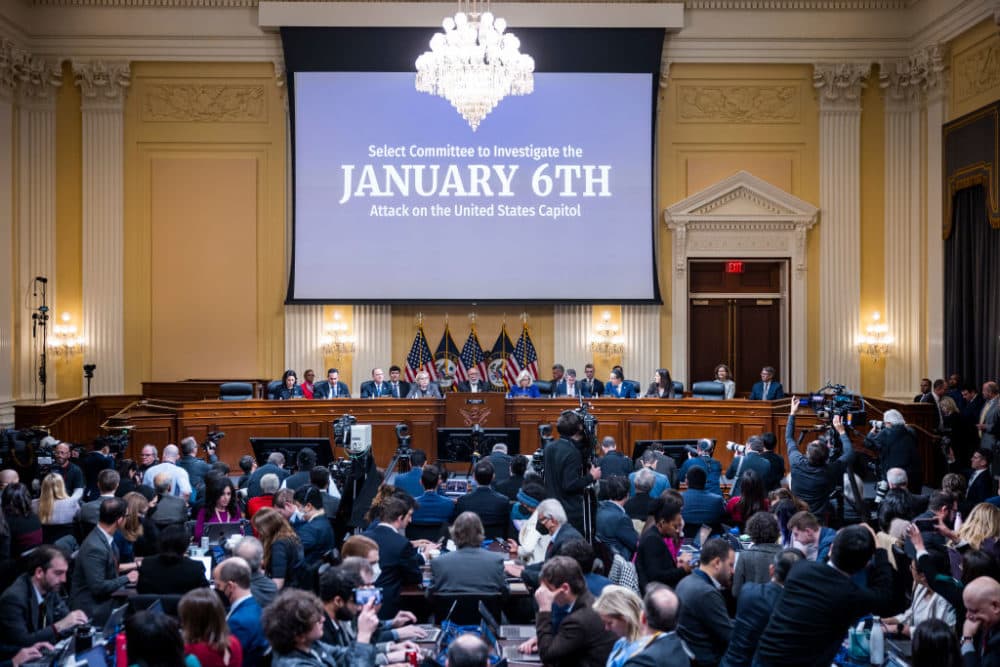Advertisement
The Jan. 6 committee report and what the DOJ may do next

Sign up for the On Point newsletter here.
For the first time in American history, Congress has referred a former president for criminal prosecution.
What will the Justice Department do?
“To this day, we do not have that direct link saying that Donald Trump planned in advance this physical attack," law professor Barbara McQuade said on MSNBC. "It may be that the Justice Department is able to do that."
Today, On Point: The Jan. 6 committee report and what the Department of Justice may do next.
Guests
Paula Reid, senior legal affairs correspondent for CNN. (@PaulaReidCNN)
Barbara McQuade, law professor at the University of Michigan. U.S attorney for the Eastern District of Michigan from 2015-2017. Assistant U.S. attorney in Detroit for 12 years, serving as deputy chief of the National Security Unit. (@BarbMcQuade)
Jack Beatty, On Point news analyst. (@JackBeattyNPR)
Related Reading
Jan. 6 Committee: "Release of select committee materials" — "Today, the Select Committee made public 34 transcripts of witness testimony that was gathered over the course of the Select Committee’s investigation into the January 6th attack on the U.S. Capitol."
Interview Highlights
On the criminal referrals the congressional committee is making to the Justice Department
Paula Reid: "They're largely symbolic. Special counsel Jack Smith, didn't need anyone to tell him that these are some crimes that he can investigate related to the former president, his associates on January 6th. He's already on it. We don't know specifically which crimes he's looking at, but he has the statute book. We know he's been investigating this. He was appointed to take over this investigation, as well as Mar-a-Lago. So, again, these are symbolic and there is a downside to this, too, right?
"Because the Justice Department has gone to such lengths to try to convince people that these are apolitical investigations. These are already underway. So, you have this committee, while it is bipartisan, the former president's attorneys and some GOP lawmakers argue it's still one sided since they make this referral. The former president's attorneys tell me, you know, now they're going to try to paint this if there are ever charges brought as being political.
"I mean, one of their defense talking points that they're putting out as well, if he's ever charged now we're going to say the Justice Department didn't do anything until this Democratic led committee told them to, which we know it's more complicated than that. But the Justice Department, again, didn't necessarily need these referrals, and it doesn't help them in this larger political messaging that this is an investigation that is being conducted objectively."
On the DOJ's approach to the committee's referral
Barbara McQuade: "What the Justice Department is thinking about here when they get a referral like this is they're already investigating. I'm sure they're very happy to have the benefit of any facts that the committee has gathered, transcripts and documents and the like. But they're going to make their own independent decision about whether to file charges here.
"I think what's different today than existed on Sunday, before this executive summary came out, is it is now apparent to the public just how strong the evidence is, and how clear it is that these four statutes were violated. The Justice Department can see the same thing. It just makes it, to me, more likely that the Justice Department's ultimate decision is going to be to file charges."
On how public perception informs decisions taken by the DOJ
Barbara McQuade: "Not much. I'd like to say zero, but I'm sure it's probably a nonzero number. You know, when I was prosecuting cases and I most certainly never had anything of this magnitude, but we did prosecute cases that received a lot of local press coverage, making decisions about whether to charge a mayor or some other public official. You would hear a lot of things like, How can they be waiting so long? The evidence is so clear. Of course, they should be charged. And you would also hear things like if they charge, it will be all political and a witch hunt and the like.
"And what we used to tell ourselves is we need to tune out the noise and make a decision based on the facts and the law. When it comes to the sufficiency of the evidence, that's absolutely the case, and there's just no role whatsoever for public sentiment. I will say, though, the reason I say it's a nonzero number is there's a second question prosecutors always ask themselves when bringing a case. And that is not just the, Can we charge the case? But, Should we charge the case?
"And what you have to look at there is whether there is a substantial federal interest in the prosecution, whether there are any collateral damages that could occur as a result of an investigation or a prosecution, and also the likelihood of success, litigation risk. You should only bring a case if you believe that you are likely to obtain a conviction that you can sustain on appeal. And I think public sentiment makes it a stronger case in terms of that likelihood of success. And so that's why I think the Justice Department wil make mostly an independent assessment. I do think when there's overwhelming public support for a prosecution, it makes it a little easier to say yes."
Advertisement
On charges in the next few months
Paula Reid: "I would never, ever even attempt to guess at a timeline on a Justice Department investigation ... from covering them for a decade. Even when you think they got those dead to rights, I mean, cases can fall apart. It's almost impossible for me to see. I will say over the next few months there is an expectation that some charges in the case, no one's talking about the former president at this point, but there are some other people in this that the cases look like they're pretty strong.
"And if they are going to charge, those charges could come in the next few months. Of course, we're referring to people like John Eastman, potentially, Jeffrey Clark, potentially. These are the kind of people who really could have legal exposure and for whom the Justice Department, for whom it is a lot easier, perhaps, to build a case based on what we know so far."
On next steps in the investigation
Paula Reid: "I'm still skeptical about whether there will be any charges brought against the former president on January 6th. It's a real uphill climb to bring a case like this, once again, where we're contemplating constitutional questions that have never been contemplated before vis-a-vis a former president. I am skeptical about whether they will actually charge him on January 6th. Mar-A-Lago, different question. But we'll see. I do expect some of his associates will be charged in the coming months."
This program aired on December 23, 2022.


